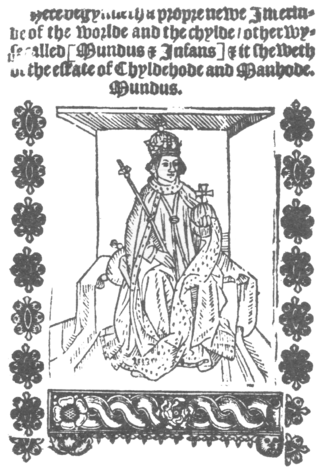
The morality play is a genre of medieval and early Tudor drama. The term is used by scholars of literary and dramatic history to refer to a genre of play texts from the fourteenth through sixteenth centuries that feature personified concepts alongside angels and demons, who are engaged in a struggle to persuade a protagonist who represents a generic human character toward either good or evil. The common story arc of these plays follows "the temptation, fall and redemption of the protagonist".
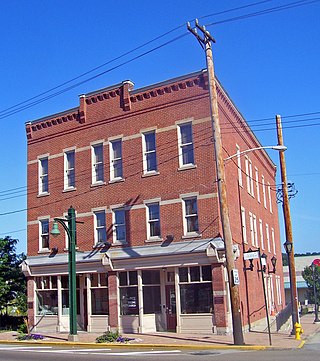
Homestead is a borough in Allegheny County, Pennsylvania, United States, along the Monongahela River 7 miles (11 km) southeast of downtown Pittsburgh. The borough is known for the Homestead strike of 1892, an important event in the history of labor relations in the United States. The population was 2,884 at the 2020 census. It is part of the Pittsburgh metropolitan area.

Youngstown is a city in and the county seat of Mahoning County, Ohio, United States. At the 2020 census, it had a population of 60,068, making it the eleventh-most populous city in Ohio. It is a principal city of the Youngstown–Warren metropolitan area, which had 430,591 residents in 2020 and is the seventh-largest metro area in Ohio. Youngstown is situated on the Mahoning River in Northeast Ohio, 58 miles (93 km) southeast of Cleveland and 61 miles (100 km) northwest of Pittsburgh.

Flashdance is a 1983 American romantic drama dance film directed by Adrian Lyne and starring Jennifer Beals as a passionate young dancer, Alex Owens, who aspires to become a professional ballerina, alongside Michael Nouri, who plays her boyfriend and the owner of the steel mill where she works by day in Pittsburgh. It was the first collaboration of producers Don Simpson and Jerry Bruckheimer, and the presentation of some sequences in the style of music videos was an influence on other 1980s films including Footloose, Purple Rain, and Top Gun, Simpson and Bruckheimer's most famous production. It was also one of Lyne's first major film releases, building on television commercials. Alex's elaborate dance sequences were shot using body doubles.
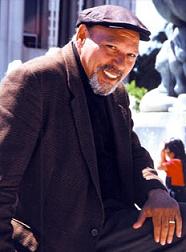
August Wilson was an American playwright. He has been referred to as the "theater's poet of Black America". He is best known for a series of 10 plays, collectively called The Pittsburgh Cycle, which chronicle the experiences and heritage of the African-American community in the 20th century. Plays in the series include Fences (1987) and The Piano Lesson (1990), both of which won Wilson the Pulitzer Prize for Drama, as well as Ma Rainey's Black Bottom (1984) and Joe Turner's Come and Gone (1988). In 2006, Wilson was inducted into the American Theater Hall of Fame.

Karl Malden was an American stage, movie and television actor who first achieved acclaim in the original Broadway productions of Arthur Miller's All My Sons and Tennessee Williams' A Streetcar Named Desire in 1946 and 1947. Recreating the role of Mitch in the 1951 film of Streetcar, he won the Academy Award for Best Supporting Actor.

Uptown is one of Chicago's 77 community areas. Uptown's boundaries are Foster Avenue to the north; Lake Michigan to the east; Montrose Avenue, and Irving Park Road to the south; Ravenswood Avenue, and Clark Street to the west. To the north is Edgewater, to the west is Lincoln Square, and to the south is Lakeview. Near the lake are some of the northern reaches of Lincoln Park, including Montrose Beach and multiple nature reserves. The area has a mix of commercial and residential development, and includes a well-established entertainment district of clubs and concert venues, and was a center for early film making. Truman College, a two-year city college, is located here, and the area's southwest corner includes the historic 19th century Graceland Cemetery.
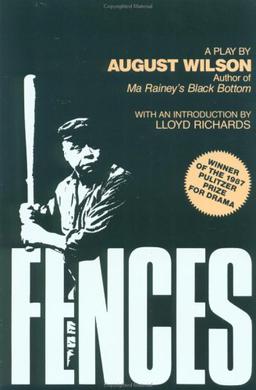
Fences is a 1985 play by the American playwright August Wilson. Set in the 1950s, it is the sixth in Wilson's ten-part "Pittsburgh Cycle". Like all of the "Pittsburgh" plays, Fences explores the evolving African-American experience and examines race relations, among other themes. The play won the 1987 Pulitzer Prize for Drama and the 1987 Tony Award for Best Play. Fences was first developed at the Eugene O'Neill Theater Center's 1983 National Playwrights Conference and premiered at the Yale Repertory Theatre in 1985.

South Deering, located on Chicago's far South Side, is the largest of the 77 official community areas of that city. Primarily an industrial area, a small residential neighborhood exists in the northeast corner and Lake Calumet takes up a large portion of the area. 80% of the community area is zoned as industrial, natural wetlands, or parks. The remaining 20% is zoned for residential and small-scale commercial uses. It is part of the 10th Ward, once under the control of former Richard J. Daley ally Alderman Edward Vrdolyak.

Hegewisch is one of the 77 community areas of Chicago, Illinois, located on the city's far south side. It is bordered by the neighborhoods of Riverdale and South Deering to the west, the East Side to the north, the village of Burnham to the south and the city of Hammond, Indiana to the east. The community area is named for Adolph Hegewisch, the president of U.S. Rolling Stock Company who hoped to establish "an ideal workingman's community" when he laid out the town along a rail line in 1883, six years before Chicago annexed the town.
Allan Leigh Lawson is an English actor, director and writer.

Bay View is a neighborhood in Milwaukee, Wisconsin, United States, North America on the shores of Lake Michigan, south of the downtown area and north of the City of St. Francis. Bay View existed as an independent village for eight years, from 1879 to 1887.
John "Johnny" Coppin is an English singer-songwriter, composer, poetry anthologist and broadcaster. He plays guitar and piano and has written and recorded many albums as a solo artist. He has a weekly one-hour show on BBC Radio Gloucestershire entitled, Folk Roots, which he has produced and presented every week since 1996. Coppin has been the Musical Director for the Festival Players since 1992.

George Selth Coppin was a comic actor, a theatrical entrepreneur, a politician and a philanthropist, active in Australia.

John Henry Reardon is a Canadian actor. Prior to 2015, Reardon starred as Blake Laviolette on the CBC Television series Arctic Air and had a recurring role as Greg Cameron on the Showcase series Continuum. As of 2019, Reardon stars as Detective Charlie Hudson on the Canadian television series Hudson & Rex.

Flowers for Algernon is a short story by American author Daniel Keyes, later expanded by him into a novel and subsequently adapted for film and other media. The short story, written in 1958 and first published in the April 1959 issue of The Magazine of Fantasy & Science Fiction, won the Hugo Award for Best Short Story in 1960. The novel was published in 1966 and was joint winner of that year's Nebula Award for Best Novel.

Pill Hill is a neighborhood in the Calumet Heights community area on the South Side of Chicago, Illinois, United States.

The Knoxville Iron Company was an iron production and coal mining company that operated primarily in Knoxville, Tennessee, United States, and its vicinity, in the late 19th and 20th centuries. The company was Knoxville's first major post-Civil War manufacturing firm, and played a key role in bringing heavy industry and railroad facilities to the city. The company was also the first to conduct major coal mining operations in the lucrative coalfields of western Anderson County, and helped establish one of Knoxville's first residential neighborhoods, Mechanicsville, in the late 1860s.

Abby Fairgate is a fictional character from the CBS prime time soap opera Knots Landing, a long-running serial about middle class life on the fictional cul-de-sac known as Seaview Circle in Los Angeles, California. She was played by actress Donna Mills between 1980 and 1989. Abby was created by producer David Jacobs as one of Knots Landing's earliest characters. She debuted in the first episode of the second season. Mills remained a principal actor in the series until she left in its tenth season. She returned for the two-part series finale in 1993, and made her last appearance in 1997 when she appeared in the reunion miniseries Knots Landing: Back to the Cul-de-Sac.
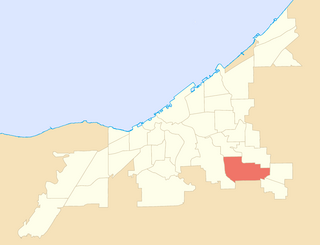
Union–Miles Park is a neighborhood on the Southeast side of Cleveland, Ohio, in the United States. The neighborhood draws its name from Union Avenue, and Miles Park in its far southwest corner.


















